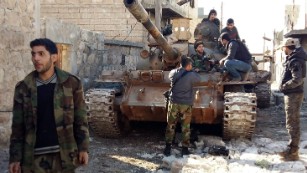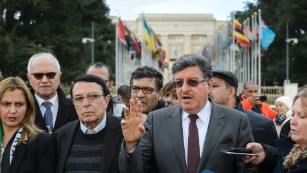As fighting continued to rage in Syria, talks aimed at ending the bloodshed came to a halt — at least temporarily — with a U.N. envoy stating “there is more work to be done from both sides” before there can be peace.
U.N. Special Envoy for Syria Staffan de Mistura on Wednesday announced “a pause” in discussions aimed at resolving the Middle Eastern nation’s years-long war, saying they should restart February 25 in Geneva.
“Our main objective is the immediate implementation of the humanitarian side of things,” de Mistura said. “Both sides expressed their interest in getting the political process started.”
Unfortunately, recent history doesn’t give much reason for optimism that this process will yield positive results anytime soon.
According to the United Nations, more than 250,000 people have been killed, 1 million injured and the majority of Syrians displaced due to ongoing violence since 2011. Multiple parties have talked about a peaceful resolution and there have been sporadic efforts to make this happen but — aside from a handful of isolated, temporary ceasefires — none have shown signs of taking hold.
Instead, there’s been more gunshots, more bombs and more carnage, all of which further strain the already precarious peace prospects.
State media: Syrian troops end towns’ years-long siege
That’s what unfolded Wednesday north of Aleppo, where Syrian state media and a monitoring group reported that Syrian government forces gained strategic ground with the help of Russian air support.
Syrian government forces, backed by pro-government militia, broke the siege of Aleppo by taking a pair of pro-regime Shiite strongholds, Nubul and Zahraa, about 30 kilometers (19 miles) from Aleppo in the country’s northwest, a Free Syrian Army leader and Syrian state media said Wednesday.
The villages had been under siege by rebel groups, including Islamist radicals, for 3½ years, according to state-run SANA.
That same official news agency reported that government troops and militia members “broke the siege” in the two towns and also retook Uwaiat village by “inflicting heavy losses on the ISIS terrorists who were positioned in it.”
The UK-based Syrian Observatory for Human Rights had reported Tuesday that more than 70 rebels and their allies were killed in the fighting, along with at least 26 regime soldiers.
Government forces managed to take control of at least one of the key supply routes used by rebels through the countryside north of Aleppo, Syria’s most populated city, according to the observatory.
Opposition: ‘Massive acceleration’
The assault complicated efforts in Geneva to secure a ceasefire, with the main opposition delegation decrying the escalation in violence Tuesday and canceling a planned meeting with de Mistura in response.
It cited the bombardment among its reasons for calling off the appointment with de Mistura on Tuesday.
The observatory said the village of Ratyan, about 13 kilometers from Zahraa, was hit heavily with airstrikes in 24 hours from Monday to Tuesday.
Parties had gathered in the Swiss city in Geneva seeking an immediate reduction in violence, with government and opposition groups meeting with the United Nations special envoy, rather than face-to-face, as they try to find common ground.
Before talks were paused, the High Negotiations Committee’s delegates met Wednesday met with de Mistura in a Geneva hotel, not a U.N. building.
Lavrov: Airstrikes ‘will not cease’
In comments made in Rome on Tuesday, U.S. Secretary of State John Kerry called on Moscow to halt the bombing.
But his Russian counterpart, Foreign Minister Sergey Lavrov, vowed to continue the airstrikes “until terrorism groups in the Arab Republic are defeated,” according to Russian state-operated news agency RIA Novosti.
“Russian airstrikes will not cease until we truly win over terrorist groups: Daesh (ISIS), Jabhat al-Nusra and such. I see no reason to stop these airstrikes,” Lavrov said during a visit to Oman on Wednesday, RIA Novosti reported.
Russia’s intervention in the Syrian conflict has decisively helped Syrian President Bashar al-Assad, whose regime had suffered major setbacks before Russian air power entered the fray in September.
The West has criticized Moscow for targeting all opposition to the Assad regime, including Western-backed moderates, rather than focusing on ISIS and other Islamist terror groups.
ISIS and Jabhat al-Nusra, as U.N. Security Council-sanctioned terror groups, are not party to the talks in Geneva.
As reported by CNN


